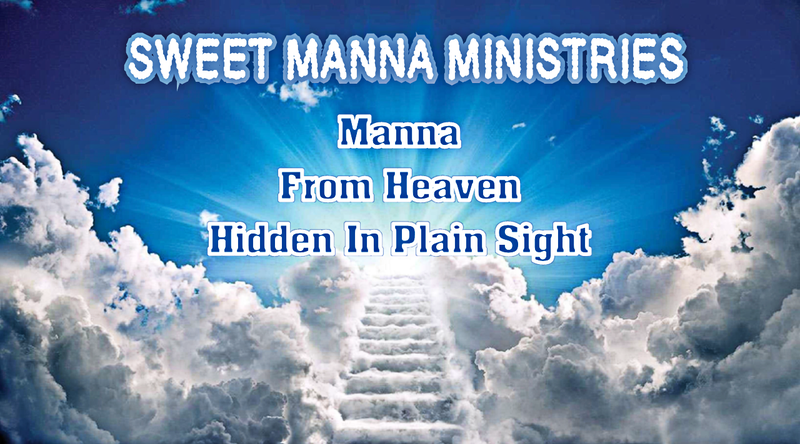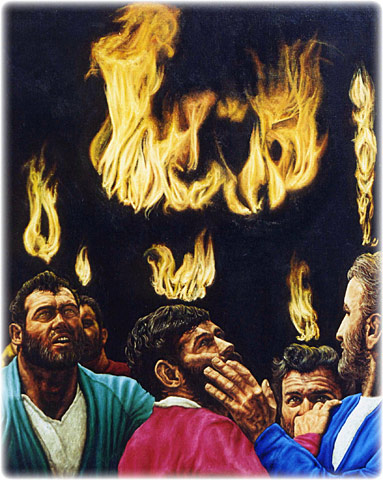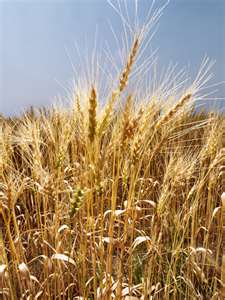The Teaching Ministry of
Rev. Marjorie Kummrow
Bible Studies
This ministry has made a choice to be "Biblically correct" as opposed to "politically correct" therefore we have forfeited the non-profit status available to us. Please note that all donations to this ministry are not tax deductible. Thank you for your support.
Pentecost-Shavuot Part 17
Pentecost occurs just 50 days from Passover and the counting of the Omer from Passover to Pentecost links it to Passover week and concludes the Spring Feasts that are the appointed times of the Lord. This study, like the other studies on the appointed times will show how Yeshua (Jesus) has revealed Himself precisely on the day that was appointed for His visitation.
Lev. 23: 15-21 15 'And you shall count for yourselves from the day after the Sabbath, from the day that you brought the sheaf of the wave offering: seven Sabbaths shall be completed. 16 Count fifty days to the day after the seventh Sabbath; then you shall offer a new grain offering to the LORD. 17 You shall bring from your dwellings two wave loaves of two-tenths of an ephah. They shall be of fine flour; they shall be baked with leaven. They are the firstfruits to the LORD. 18 And you shall offer with the bread seven lambs of the first year, without blemish, one young bull, and two rams. They shall be as a burnt offering to the LORD, with their grain offering and their drink offerings, an offering made by fire for a sweet aroma to the LORD. 19 Then you shall sacrifice one kid of the goats as a sin offering, and two male lambs of the first year as a sacrifice of a peace offering. 20 The priest shall wave them with the bread of the firstfruits as a wave offering before the LORD, with the two lambs. They shall be holy to the LORD for the priest. 21 And you shall proclaim on the same day that it is a holy convocation to you. You shall do no customary work on it. It shall be a statute forever in all your dwellings throughout your generations.
From a historical standpoint the giving of the Torah on Mt. Sinai was the first Shavuot. After Moses lead the people of God out of Egypt they found themselves camped at the foot of Mt. Sinai. It was there that the Lord appeared to them with fire and smoke with lightning and thundering and the sound of the Shofar. It was at this mountain that the Lord presented to them the contract of great blessings, the commandments. It is thought that this was the birthing of the nation of Israel. The giving of the Torah is thought of as a ketubah i.e. a marriage contract. More can be found concerning this marriage language in the study entitled “The Wedding of the Messiah.” This was Israel’s time of betrothal. It is here that the Lord promised to bless them in every place where the Lord recorded His name. Their part of the contract was to obey, which they promised that they would do. 1
However, their faithfulness was short lived. They became unfaithful and committed spiritual adultery. Because Moses was delayed in returning from the mountain of God with the commandments, the people began to worship the golden calf which they had made in Moses’ absence. Because of this rebellion 3,000 men died by the sword at the giving of the Torah. 2
Although the statute applied to men, the entire family participated in the feast or celebration. It was a joyous time of thanksgiving and as the people of God made their pilgrimage from distant places to Jerusalem, long processionals could be seen on the roads leading to the city. They came dancing and singing and bringing their offerings of the first portion of the harvest to be presented with thankful hearts in the Temple to the one and only God who blessed them with a plentiful harvest. During the counting of the Omar the people counted with great anticipation for this day to arrive, because it meant that everyone would be gathering together as one big happy family rejoicing and having a party to celebrate the God that had revealed Himself to them at the Red Sea as King, that He had given them the Torah in order to instruct them how to live in His Kingdom, and because they were His treasured people that He had made covenant with, He blessed them with rain for a bountiful harvest
In Leviticus they were instructed to grind the wheat into flour and bake two loaves of bread. Unlike the instructions at Passover, these loaves of bread were to be leavened. These two loaves of bread were to be presented by the Priests before the Lord as wave offerings. 3 Once again we see the strokes of the Almighty painting pictures for us in the symbolism of this feast as He did during the feast of Passover. Leaven always represents sin and it was forbidden during the Passover season because Passover and Unleavened bread speak of Yeshua who was without sin.
The two loaves of leavened bread at Shavuot speak of the followers of God, those that would be saved from their sin. Although we are called to be Holy, we are never-the-less still not without sin. Passover represented the message of Salvation and Shavuot speaks of a harvest of souls. This is the season of the wheat harvest and wheat harvest represents the harvesting of souls. Some say that one loaf represents Israel and the other loaf represents the Church. Some say that one loaf represents the Jewish believer and the other the Gentile believer. I believe the latter because of the events that took place on the first Pentecost after Yeshua’s resurrection. First the Jewish believers received the Holy Spirit in the upper room and then shortly after that the Holy Spirit was poured out upon the Gentiles, much to the surprise of the Jewish followers of Yeshua. 4
Remember in the previous studies about the appointed times we discussed how these feast days are rehearsals for some future fulfillment. For 3,000 years this rehearsal took place. For 3,000 years the two loaves of bread were waved before the Lord. For 3,000 years Shavuot was a celebration because of the wheat harvest. Then one day in the upper room in Jerusalem where Yeshua’s Jewish followers were gathered in one accord, there came the sound of a mighty rushing wind and thundering such as were heard on the first Shavuot at Mt. Sinai when the Torah was given. Just as the Holy One revealed Himself at Mt. Sinai in fire, He also did so at Pentecost in that upper room. Over everyone’s head were tongues of fire dancing to the worship and praise of the people of God. It was Shavuot, it was harvest time and those in the upper room received the Holy Spirit and because of their witness in the city of Jerusalem a harvest of 3,000 people were brought into the Kingdom on that day with many more to follow. The precision of the Lord continually amazes me. It certainly was not by any coincidence that the exact amount of people that died by the sword because of the rebellion at Mt. Sinai on Shavuot were 3,000, and those receiving the Holy Spirit on Shavuot some 3,000 years later were also 3,000.
What a “Wheat Harvest”! Just amazing!
It was on the 40th day of counting the Omar before Jesus ascended to His Father, that He instructed his disciples to wait in anticipation for something more. He told them to wait for the promise of His Father. The counting of the Omar was always in the anticipation of Shavuot with the sense that God had something more. He had revealed himself to them on this day, and he had given them the Torah to instruct them in the ways of the Lord also on this day. Yeshua, had been crucified, buried, and rose from the dead, yet He was instructing his followers to wait because there was more. It was on this day, this appointed time, that the Holy Spirit was poured out upon the believers in Yeshua and they all began speaking in unknown tongues. It was the day that God was renewing His covenant with his people just like He had promised. It was His appointed time for that to take place.
Joel2:28-29 28 "And it shall come to pass afterward That I will pour out My Spirit on all flesh; Your sons and your daughters shall prophesy, Your old men shall dream dreams, Your young men shall see visions. 29 And also on My menservants and on My maidservants I will pour out My Spirit in those days.
Jer. 31:31-3431 "Behold, the days are coming, says the LORD, when I will make a new covenant with the house of Israel and with the house of Judah-- 32 not according to the covenant that I made with their fathers in the day that I took them by the hand to lead them out of the land of Egypt, My covenant which they broke, though I was a husband to them, says the LORD. 33 But this is the covenant that I will make with the house of Israel after those days, says the LORD: I will put My law in their minds, and write it on their hearts; and I will be their God, and they shall be My people. 34 No more shall every man teach his neighbor, and every man his brother, saying, 'Know the LORD,' for they all shall know Me, from the least of them to the greatest of them, says the LORD. For I will forgive their iniquity, and their sin I will remember no more."
Since this is an everlasting statue, is it not possible that on some future Pentecost, some fulfillment will take place on this appointed time that is fixed by God? Is it not possible that there will yet be something more? Why else are we to count the Omar in anticipation from Passover to Shavuot forever? Because of this anticipation for something more, there are those that have made it a tradition to stay up all night on Shavuot or Pentecost studying the Word of God in hopes of a visitation from The Holy One. After all He is the One that has said, “Won’t you meet with me on my appointed times?” There are those that believe in the possibility of the rapture taking place on Pentecost. I believe that it is very likely that the rapture will take place on a feast day and Pentecost is to be considered. However, I lean toward the rapture taking place during the fall feasts.
These spring feasts have been fulfilled by Yeshua; however the fall feasts are yet to be fulfilled. If the Lord has painted for us such beautiful pictures of Yeshua in the spring feasts; and if He fulfilled them on the exact day appointed, don’t you think that He has done the same for us by revealing Yeshua in the fall feasts? If the spring feasts or appointed times speak of this first coming, would it not make sense that the fall feasts, since they are yet to be fulfilled, speak of His second coming? I believe that they do. Therefore, every student of the word should be aware of the awesome significance of these appointed times of the Lord in the fall of the year. Those appointed times in the fall are Rosh HaShanah the Jewish New Year, Yom Kippur The Day of Atonement, Sukkot The Feast of Tabernacles, and Shemini Atzeret with Simchat Torah, The Eighth Day and Rejoicing in the Torah.
1 Ex. 24:3
2 Ex. 32:28
3 Le. 23:20-21
4 Acts 10:45
This concludes this series of The Spring Feasts. Stay tuned for the next series "The Fall Feasts.
If you have any questions, please feel free to email us.
Be Blessed
Rev Marjorie
marjorie@sweetmanna.org
Contact us to be put on our email list at mailinglist@sweetmanna.org or make a prayer request at prayerwarrior@sweetmanna.org
Pentecost-Shavuot
Part 17
Pentecost is the Greek name which means 50, for the appointed feast of the Lord known in Hebrew to be Shavuot, which means seven weeks. It is the climatic celebration that takes place 50 days after the second day of Passover. It is the day of anticipation that the counting of the Omar looks forward to.
The Hebrews were instructed to count seven Sabbaths from Passover, and then on the day after the seventh Sabbath they were to offer a grain offering to the Lord. This 50th day became known as Shavuot, or Pentecost.
Shavuot is also called the Harvest Festival. It falls in late spring at the time of harvesting the wheat. It is connected to the barley harvest at the time of Passover by the counting of the Omar to the 50th day or to Pentecost. It concludes the appointed times of the Lord that are to be celebrated in the spring of the year. It is one of three required feast days when all males were required to be in Jerusalem to meet with the Lord.
All three feasts are said in scripture to be for all generations to remember forever, and to meet with the Lord on these appointed times, as it indicates in the above scripture.


